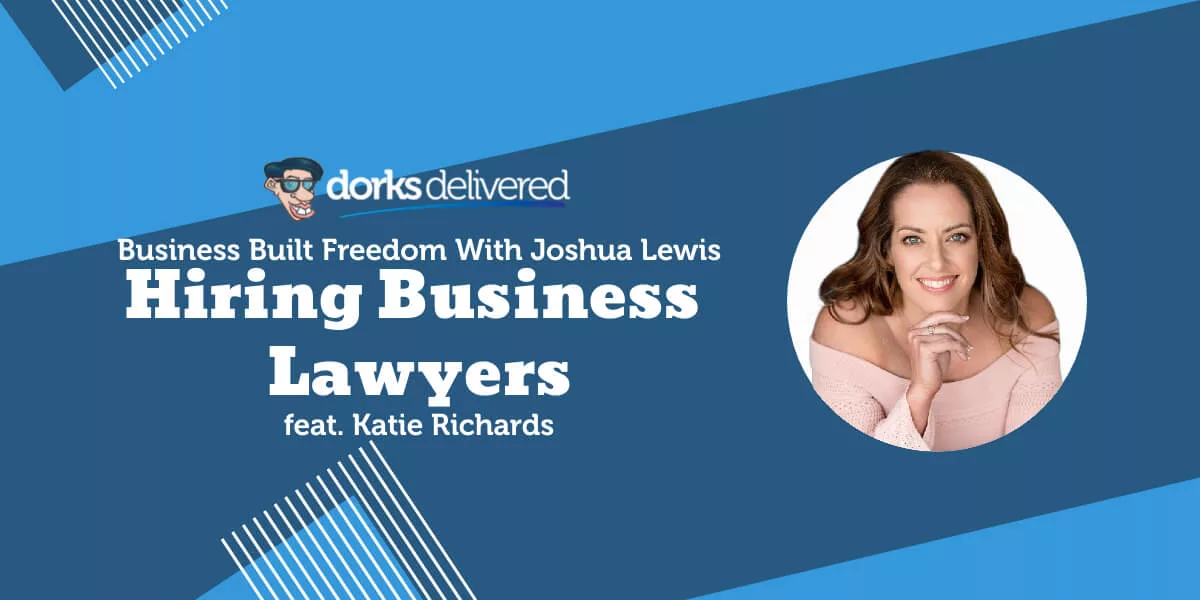Hiring a business lawyer is a crucial step that most companies will have to take at some stage. Having a qualified legal professional on your side can provide a multitude of benefits, from protecting your company’s interests and assets to offering guidance on complex legal issues. Whether you’re starting a new business, expanding into new markets, or dealing with legal disputes, a business lawyer can provide the expertise and support you need to succeed.
Katie Richards is a commercial solicitor passionate about systematisation and efficiency who is the CEO at Law on Earth. She joined Josh to talk about why and when you should hire a business lawyer and all the tips and tricks that you need to know.
Does every small business need a lawyer?
It depends on what phase of the business they’re going through at the time. I would always suggest that before someone gets into business, have a chat with a lawyer first so they understand what legal needs they’re going to have coming up over the life of the business.
You get a bit of a strategy in place because it’s not just your business planning that’s important. You have to understand what legal risks happen at the beginning, while you’re running the company, and then also on exit so you can be ready for them and then you’ll be less likely to need lawyers along the way if you already know what to watch out for.
When should you hire a business lawyer?
I think you should hire a business lawyer before you start turning over any money. It’s right at the beginning when you have a chat with an accountant because you need to work out what kind of structure you should be setting up before you go and set the business up. That’s important because the structure comes down to how much risk is going to be on you personally.
How can a business lawyer help you?
If you’re set up as a sole trader, you could have issues such as something going terribly wrong in your business, especially if it’s your first business. If you don’t really understand how businesses
operate, you could have your house on the line. You could lose your car, all of your assets, and all of your savings because you are personally liable as a sole trader, whereas generally, people will wait for a while before they set up a company down the track.
There also could be taxation issues if you do that. If you’ve got some potential contracts already set up, you’re probably better off going down the company path from the start. You know that the revenue amount is likely to be a lot higher. The right time to talk to someone about that is actually before you start trading and then you’ve got a bit of a road map and you understand why.
At Law on Earth, we’ve made multiple free guides this so that people can just go and have a look at them, get an understanding around what all the different options are in terms of the structures, think about what would actually suit their lifestyle not only now, but also in the future.
Think about the future
Think three, four, or five years ahead because if you set up as a sole trader now, you’re going to be paying tax through the roof once you get over a certain financial amount. No one in their right mind is going to want to set up a business if it’s not generating at least a decent amount of money that exceeds what you were doing as an employee, unless you’re only doing it as a hobby or for some kind of lifestyle benefit, because there is a lot of pain that comes with setting up and running businesses.
You must have a good reason why you want to put yourself through that. Otherwise, sometimes it is easier just to remain an employee, doing what you love.
Help your employees get rid of repetitive tasks. Talk to us about automation.
How often should you talk to a business lawyer?
It depends on the person who’s setting up the business and what their circumstances are. The way that I deal with clients is that I’ll have that initial chat with them. I’ll give them a list and priorities as to what they should do and how soon they should get them done and at what stage of the business they’ll think about activating the next step.
That way, it gives them the tools that they need to actually go away and be in control of what they’re doing. We have stuff in the learning centre that will help them do that. As they reach those little milestones in their business, they know what to do and what to watch out for. That just makes it a lot easier. It takes a lot of the anxiety away from the business.
Learn more about technology that can help you drive your business to success.
How do you legally protect yourself from risks in business?
1. Set up a business plan
I think what people really need to be doing at the very beginning is setting up a business plan. Most people put it in a drawer and they don’t have a look at it again. That’s not useful. You need to write some kind of document about all the things that could go wrong in this business and then write out your mitigation. If this happens, what would I do next and then next and then next so that you don’t have to worry about those kinds of risks so much because you’ve thought about it.
2. Have a business continuity plan
Your next step is to look at each of those risks and think about what you can insure and what you can minimise any risk for. How likely is it to happen? If it does happen, like the electricity goes out and you can’t run your business, can we jump to another premises so we can keep trading? If not, do we need business continuity insurance in place? Pulling all those ideas together is what we call a business continuity plan.
Continuity is essentially continuing. What kind of plans do we need to put in place so no matter what comes up, we’ve actually got a Plan B that we can jump to straightaway. How do I train my staff to also know what the Plan B is at any point in time?
Otherwise, if you end up building a business where you’re stuck in it and no one else can run it for you, you’re going to end up basically buying yourself a job but that’s quite a high risk. And you don’t want to go through the pain of building a business and get to make this great revenue to have it all ripped away from you all of a sudden.
Are you planning to start a business? Let us handle all the techy stuff!
3. Have a Risk Mitigation Strategy
Risks are really important. If you don’t watch the risks in your business, you won’t have a business.
What I’ve done is I looked at all the risks and wrote up a disaster recovery plan as well as a business continuity plan. And then I took that to the insurer and put them on notice on what I’ve asked them to insure for so there can’t be any grey areas as to what risks they had to cover. It actually makes them accountable.
Second, I said, ‘I’ve done all this risk mitigation. I want you to give me a discount on insurance because I’ve done half of your job for you.’ That’s actually helpful too because you can get your insurance premiums reduced because I know exactly what risks need to be covered.
When it comes to things like negotiating a contract with someone else, sometimes what people do is they contract out of provisions. If I say, ‘We don’t want this liability clause in there.’ and the business owner is like, ‘Oh, yeah, no worries.’ because they want the big contract. The problem is if you actually contract out of something that the insurance company then can’t use to help you fight that claim, then your insurance sometimes might payout. You must have a think about those kinds of things.
Insurance Can Be a Double-Edged Sword
Insurance can also be a double-edged sword. If you cut corners, you could end up not getting insurance paid out. I think it’s a really good way of knowing the risks, making sure that you’ve covered up on what you can and that your systems actually back up what you say they’re doing. It makes your business more valuable.
Should you use legal documents or templates available online?
This is my biggest pain point. This is literally the entire reason I set our platform up. The problem with templates is that people don’t know what’s in them. When you actually sign a template or some kind of contract without understanding what’s actually in it.
There is no standard contract. It just doesn’t exist. You can contract out of protective rights you would have had under the law if you had no agreement in place at all. You can contract out of different types of rights that can be in that agreement.
What we did was we went through and drafted out all the precedents that you would need for business and then you get a guide that comes along with it and explains in simple English what every single clause in that agreement means so you can understand what you’re doing.
Make sure you understand what’s in the agreement before you sign it. If you don’t understand it, don’t sign it because you could really do yourself some damage. That’s why we get a lot of the cleanup work from people just using templates they found on the Internet. Sometimes they use American documents, and sometimes they don’t even change the names in the contract.
Learn More About the State of the Insurance Industry in Australia in 2022
How does Law on Earth work?
It is simple. It’s a social enterprise that was set up for a social purpose. It’s essentially established just to help people. Just go on the platform and set up a free account. Once you’ve got a free account, you’ll get a full dashboard so you can go into the learning centre and have a look at all these different guides that teach you what you should look out for, and what to do next.
Once you’ve found a guide that matches your legal situation, you can then work out whether you just go and get the documents in our system. You can just answer a simple question. The system actually does much of the legal work so it’ll slot all the right clauses in and then give you that human God that we talked about and then you can read through that.
If that doesn’t work for what you wanted practically in the business, go back, unlock the document and then answer the questions again. It will slot different clauses in there. You have complete control over it. You don’t necessarily have to get a lawyer if you don’t want to get a lawyer, but you can do that.
Some people do more videos, others do fewer videos and go crazy on the documents and then go and do the business stuff, set up their wills and powers of attorney, and all that stuff. Some people check in every week because it’s just easy and affordable for them to do it bit by bit.
It helps people with whatever they’re dealing with because if they need it, someone else is going to need it at some stage as well. We just have a team of guys here that just jump straight on it.
Get free guides to setting up a business in Australia + affordable legal advice.
Mitigate risks and turn your IT into a utility. Schedule a free consultation or check out the Dollar IT Club for affordable business solutions.
[module-379]






























